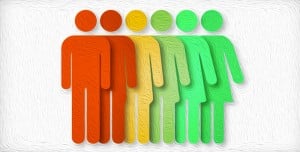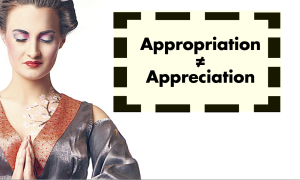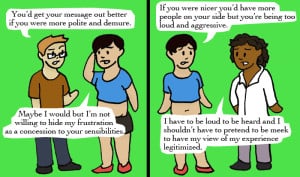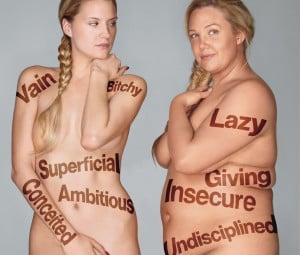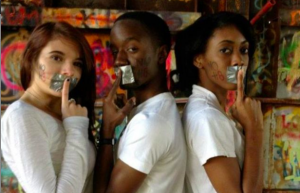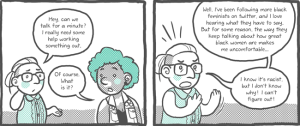
Source: Quantem Test Prep
The best way that I can describe coming to terms with several of my privileges is that I had an overwhelming feeling that I was being mentally gnawed on — that the truth literally had teeth.
As the evidence of my privilege was set before me, a choice was revealed: I could choose to reject these truths and live happily in my ignorance, protected by my privilege that allows me to do that; or I could begin the process of accepting the truth and start making changes.
I am choosing to accept the truth.
I say “choosing” — and not “chose” — because I make the choice every day to acknowledge my privileges and actively fight against oppression. It is an ongoing process.
As a person with multiple privileges, if I don’t make this a daily choice, then I can easily retreat into my privilege and ignore the things that other folks must contend with.
Privilege is the magic carpet that allows you to sail over the worries of others without ever having to look down.
And if I don’t make an active choice to defy this tendency, I’ll slip back into it.
I am far from perfect about it. Sometimes my ignorance is on full display, and it takes a fine feminist friend to say “What the hell?” before I realize what’s happening.
But that is how it works. You try, and you try, and you mess up, and you try again.
This article is not about convincing you that privilege is an actual thing and that you have it. It’s for the person who is feeling the truth gnaw at them and may be struggling with it.
Here are four uncomfortable thoughts that people face when learning about their privilege, and why it’s okay to feel this way.
1. I Feel Like I’m Being Made Out to Be a Villain
Most folks don’t consider themselves to be “bad people,” and they don’t like it when they feel that others are telling them that they are. Folks like to think that they are thoughtful and enlightened.
So when someone is confronted with the message that they harbor prejudices, that they benefit from the discrimination and prejudice against others, and that they are active in keeping this system in place, they often reject it and view it as a baseless attack and outright deny privilege.
In fact, it’s common for people with privileges of all kinds to believe that it’s actually they who are discriminated against and that it is others who have privilege.
For example, a few weeks ago, I read a post that indicated that ableism doesn’t exist because there are “special” parking spaces and restroom stalls. They went on to explain that it is actually people who are considered disabled who have privilege.
Many men will tell you with full conviction that it is women who have privilege by throwing out a fun fact like, “In a domestic violence situation, it will be my ass that goes to jail.”
And sometimes this defensiveness leads to more personal attacks that aim to invalidate the person who’s pointing out your privilege.
When people don’t like what you’re saying, a common reaction is to compare it to something really extreme to scare the hell out of everybody and convince them to not look deeper.
A few weeks ago, a man, after reading something that I wrote that mentioned patriarchy, tweeted that I am “teaching women to hate men and men to hate themselves.”
This is a classic example of misrepresenting a message in order to invalidate it.
Wanting men to recognize their social, economic, and political privilege = we want women to hate men and men to hate themselves.
When you begin to come to terms with your privilege, it’s very common to feel that you are being vilified (even if you aren’t). But if your reaction is to be dismissive, you are choosing denial over critical analysis.
You are allowing these simple arguments to dissuade you from seeking the truth. And that’s not a healthy or fulfilling way to live.
Being told to “sit down and shut up” can be difficult, especially when you think you’re doing something right. This happens a lot and is often used as a way to justify disparaging a movement and even to deny privilege. “See, this is the reason you feminists get a bad name…”
And it can be like quicksand for someone who is starting to question their privilege.
You may ask a question or make a comment that receives a very stern and surprising response. It’s about that time when you may be most tempted to get back on that magic carpet and fly right out of there.
But here is some free advice from someone who has stuck her foot in her mouth more than once: If you feel the heat of criticism while learning about your privilege (and you will at some point because we all do), stop talking and listen.
Now trust me, I know how difficult this can be. One of the benefits of privilege is that it usually protects us from being censured. When coming from a position of privilege, a common thought process goes something like this: “Hey, I have something to add to this discussion, and I have the right to express it!”
But the whole point is that it ‘ people who have your particular privilege who have been doing the talking all along. So no matter how uncomfortable it may feel, no matter how much you have to bite your tongue, if you really want to be on the side that fights against oppression, you will need to listen when someone confronts you on your logic.
If those you have offended are not in the mood to explain where you went wrong, try to accept it. Fight the temptation to start discrediting them and their message, even if you’re hurt.
Get up. Brush yourself off and try again, right alongside the rest of us. If you see where you have made a mistake, then give an unconditional apology. If you don’t see it, wait. Sometimes it comes to you later as you begin to connect more dots.
I realize that words can hurt. They can be sharp and cut straight through. But that doesn’t mean that they aren’t true or that you shouldn’t listen.
2. I Feel Like My Family Is Under Attack
Some people begin to think about their own family tree when confronted with certain privileges.
Maybe you had ancestors who had experienced poverty and oppression from wherever they came, and the effects of that have been felt for generations.
This may make believing that you have experienced any type of “privilege” a little difficult. It may actually piss you off and tempt you to walk away.
But if you do, you’ll be missing out on great opportunity for enlightenment and self-reflection!
Most folks have certain privileges, but are marginalized in other aspects of their life. For example, your family may have had racial privilege, but as immigrants, they still may have faced discrimination and stereotyping.
You may not be cognizant of the role your family’s privilege played in your everyday life — no one expects you to, at first. That is kind of the hallmark of privilege: You don’t have to be aware of it, and it still works in your favor.
The best advice for you here is to go back to the basic steps of thinking, reading, and listening. I have no doubt whatsoever that if you do these three things, you will begin to notice your privilege alongside the areas that you may have been marginalized.
3. I Don’t Feel ‘Privileged’
One of the most annoying Facebook memes that I notice floating around features a person who is homeless, elderly, and White sleeping on a park bench, and the caption reads “Well, at least you have your White privilege.”
This argument feels good in the privileged mind. You can simply convince yourself that privilege must equal wealth or power, and if you don’t have that, then you don’t have privilege. Phew. What a relief!
Many falsely believe that if they’ve suffered at all, then they can’t be privileged.
We have a tendency to turn to this argument when someone is challenging us about our privilege or the minute we start to experience a feeling of guilt and we don’t like it. In actuality, it doesn’t do anything to refute the existence of privilege at all.
On the flip side, folks who have worked hard take offense at the idea that some type of privilege benefited them in some way. For them, it can seem as if acknowledging the ways that they are privileged would be to say that they didn’t earn what they have.
This is an understandable initial reaction. You may have indeed worked very hard to earn what you have.
But accepting your privilege doesn’t minimize your hard work or even water-down your success. It just requires you to acknowledge that the starting gate is not at the same place for all people.
Certain privileges do aid in our success in ways that are invisible to the privileged naked eye, unless you really decide to look.
So do that. Take a look. It’s worth realizing your privilege if you want to be authentic, honest, and part of a movement that wants to improve the conditions of all people.
It’s easy to fall back on comfortable ways of thinking — to mentally misrepresent what privilege really is in favor of something that is more psychologically palatable. You have to make the effort not to.
Trust me. It will be worth the discomfort and vulnerability.
4. You’re Asking Me to Change!
Well…yes. We are.
And that can be hard to accept when you don’t think you’ve done anything wrong. It feels safer to hold on to our belief that all things are fair and equal, or that we are actually getting the short end of the stick.
What other choice is there? If I don’t believe this, then I have to take action, right?
I can’t deny that I am willfully involved in the oppression of others. If I do, all of a sudden the weight of everything those feminists have been talking about rests on my shoulders, too.
Yes, it does.
But honestly, it did all along. You just have an opportunity to do something about it now.
And this, as they say, is where the rubber meets the road. If you take an honest assessment of yourself and all the things that support your thoughts, beliefs, and behaviors, you may get this gnawing sensation that you need to make changes and you may fear the cost.
What will others think when I am no longer amused about something I may have laughed at six months ago?
Will I have to change my thinking? my behavior? how I communicate? Maybe. Probably.
But is that really the end of the world? No.
So have courage, and don’t let the fear of being challenged prevent you from doing what is right.
***
Coming to terms with your privilege is an active, ongoing process. It requires a person who will think, read, and especially listen.
You must be willing to do the right thing without getting a pat on the back. After all, we really shouldn’t expect one for simply acknowledging the truth and responding accordingly. You are also likely to receive some crap for it.
What’s the carrot? The satisfaction you get from trying to make a difference — and the companionship of some amazing people along the way.
So yes, coming to terms with your privilege will likely be uncomfortable. But you will find that it’s worth it.
[do_widget id=”text-101″]
Dr. Robin Landwehr is a Contributing Writer for Everyday Feminism She’s a mental health counselor and an unapologetic feminist. She holds a Doctor of Behavioral Health degree from Arizona State University, a M.S. degree in Mental Health Counseling from Capella University, and is a licensed counselor in North Dakota and Florida. She is a National Certified Counselor through the National Board for Certified Counselors. Robin has worked in several areas of human services including: domestic and sexual violence, substance abuse, homelessness, child abuse and neglect, mental health disorders, and health concerns that are affected by our behaviors. You can follow Robin on Twitter @RobinLandwehr1 or visit her sometimes neglected personal blog at the Hippie in Me Blog.
Search our 3000+ articles!
Read our articles about:
Our online racial justice training
Used by hundreds of universities, non-profits, and businesses.
Click to learn more





